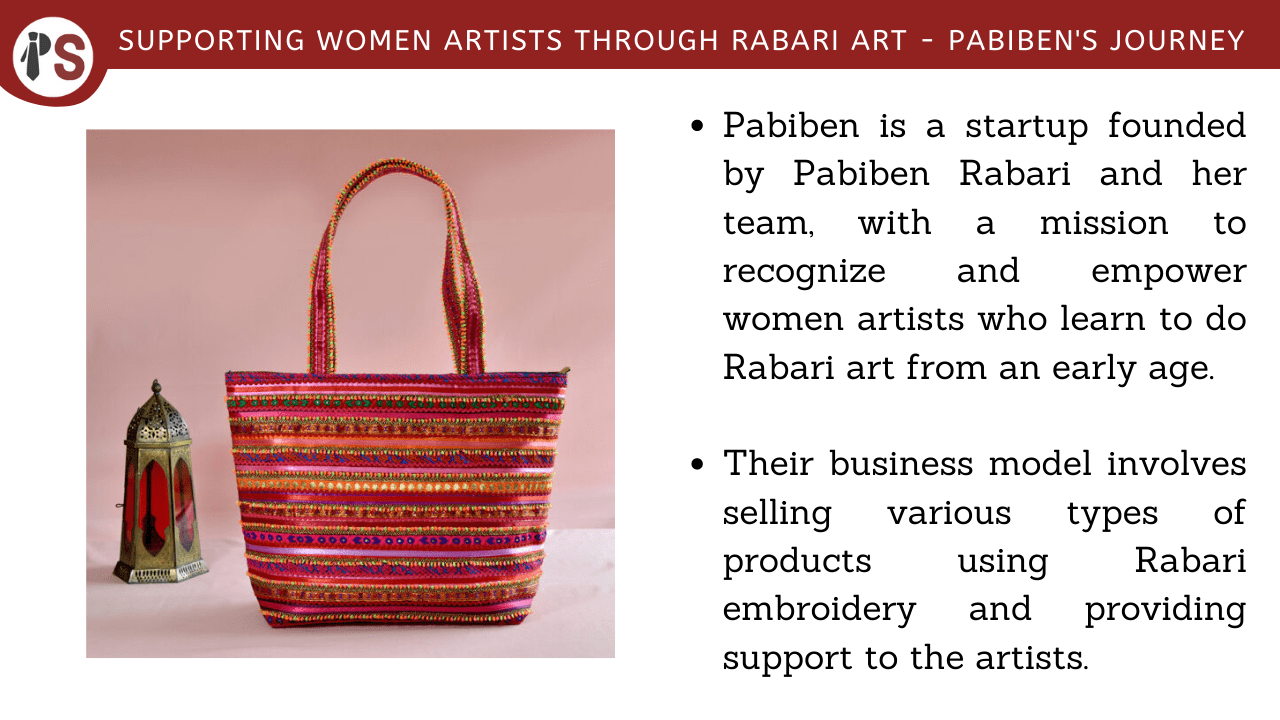
Pabiben is a startup founded by Pabiben Rabari, an artist and businesswoman from Gujarat, along with Nilesh Priyadarshi and Nupur Kumari. The company aims to give recognition and support to the community women who learn to do Rabari art from an early age. They manufacture different types of bags, accessories, and gift boxes using Rabari embroidery and sell them through their online platform.
Pabiben's vision is to find such artists from all over India, give them recognition, and help them start their businesses. They want to represent their work in front of the world and prevent big designers from buying this artwork at a cheaper cost and selling it at higher prices, leaving the women with no money and no recognition.
VISION OF THE STARTUP
The vision of Pabiben is to support and give recognition to the community women who learn to do Rabari art from an early age. Pabiben aims to find such artists from all over India, give them a platform to showcase their talent, and help them start their businesses. The company's ultimate goal is to represent the work of these artists in front of the world and prevent big designers from exploiting their talent by buying their artwork at a cheaper cost and selling it at higher prices.
Pabiben's vision is not just limited to selling Rabari embroidery products. They want to provide a sustainable business model to the artists and improve their standard of living. To achieve this, the company has taken various initiatives like Karigar clinic, where health check-ups of women artists are conducted to ensure their well-being, and Karigar ki dukan, which allows staff to explore the market of the products and find new opportunities for the artists.
Through their efforts, Pabiben aims to empower women artists and help them to become self-reliant. The company's vision is to create a world where artists are recognized and appreciated for their talent, and where they have the opportunity to create a sustainable livelihood for themselves and their communities.
BUSINESS MODEL
The business model of Pabiben is centered around empowering women artists who specialize in Rabari embroidery. The company sells various types of products such as bags, accessories, and gift boxes using Rabari embroidery, through their online platform.
The business model of Pabiben is unique because it provides a platform for the artists to showcase their work and earn a fair price for it. Pabiben's products are handmade by the artists themselves, which gives them a sense of ownership and pride in their work.
Pabiben's business model also involves providing support to the artists beyond just selling their products. The company has taken initiatives like Karigar clinic, where health check-ups of women artists are conducted to ensure their well-being. They also have the Karigar ki dukan, which allows staff to explore the market of the products and find new opportunities for the artists.
Pabiben's business model is sustainable because it provides a fair price to the artists for their work and creates a direct relationship between the artists and the customers. This way, the artists can build a loyal customer base, and customers can appreciate the value of handmade products made by skilled artisans.
SALES AND REVENUE
Pabiben specializes in the production and sale of machine embroidery and handmade embroidery bags. The company offers two different types of bags at different price points - a machine embroidery bag priced at ?1790 and a handmade embroidery bag priced at ?6900.
The company currently has around 500 SKUs (stock keeping units), which refers to the different variations of products they offer. Despite being a relatively new player in the market, Pabiben has achieved impressive lifetime sales of 2 crores, indicating that their products have resonated with customers.
Looking at the sales figures in recent years, Pabiben appears to be experiencing steady growth. In the FY 21 to 22 period, the company achieved sales of 36 lakhs, up from 28 lakhs in FY 20 to 21 and 33 lakhs in FY 19 to 20.
The gross margin for Pabiben is 50%, which means that half of the revenue generated from sales goes towards covering the cost of goods sold. The net margin, which factors in other expenses such as operating costs and taxes, is 35%. This is a healthy margin for a business, as it indicates that Pabiben is able to generate significant profit from its sales.
JOURNEY IN SHARK TANKS INDIA
The owner of the company made an initial ask of ?50 lacs for 5% equity of the company at a valuation of 10 crores.
One of the investors, Namita, gave an offer of 5 lakhs for 2% equity and 45 lakhs at debt with a 0% interest rate. However, the owners of Pabiben countered with an offer of 10 lakhs for 5% equity and 40 lakhs debt at 0% interest.
After some negotiations, the final deal was closed with Namita at 10 lakhs for 5% equity and 40 lakhs debt at 0% interest rate. This deal allowed Pabiben to secure the necessary funding to further develop their business.
The funding process in Shark Tanks India for Pabiben involved a series of offers and counter offers, eventually leading to a mutually beneficial agreement between the company and one of the investors.
At Professional Saathi, we offer a range of business consultancy services that help businesses improve their performance, achieve growth, and overcome challenges.
Copyright 2026 © Created By KTPG PROFESSIONAL SAATHI CORPORATE CONSULTANT PRIVATE LIMITED, All Rights Reserved.
Leave Your Comment